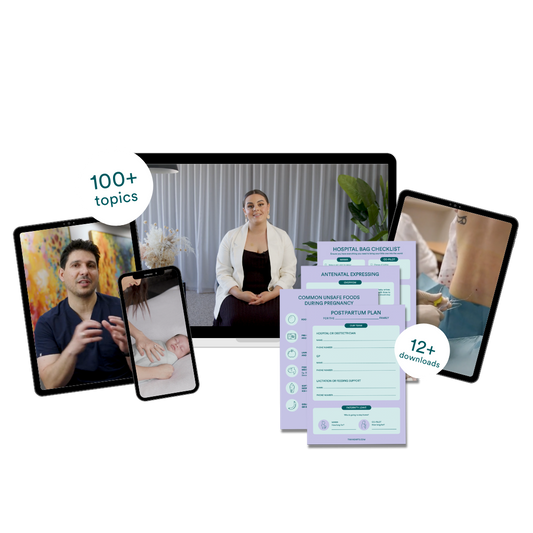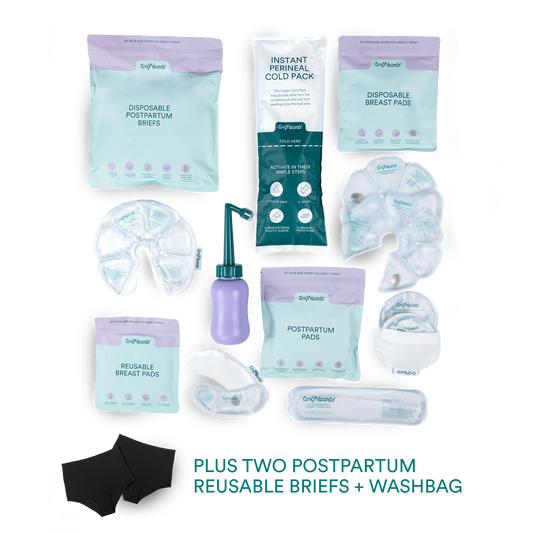Little ones get sick; it's just a fact. Sometimes it can feel like they're sick constantly, and in that first year of daycare, they probably are. But with little ones being sick comes parents also getting sick or having to take yet another day off from work. Sometimes kiddos might be seriously unwell, a little bit sick or just have one or two symptoms, leaving many parents to wonder, is my baby too sick for daycare, and when can they go back to daycare after certain illnesses?
Red flags
As always, let's start with the red flag symptoms you're looking out for that your bub needs medical attention [and definitely shouldn't be going to daycare with]:
🚩Aged 3 months or under with a fever of 38 or above
🚩Difficulty or unusual breathing
🚩High-pitched, weak or continuous cry
🚩Pale, blotchy or blue skin
🚩Drowsiness or unresponsiveness
🚩Seizures
🚩A rash that doesn't fade when you press on it
🚩Symptoms of dehydration like reduced wet nappies + reduced fluid intake [such as refusing to breast or bottle feed]

Common illnesses + their exclusion period
Some illnesses are more contagious than other illnesses and often have an exclusion period. This means there is a set criteria set out by the Government that your little one must meet before they can go back to school + daycare. These are some more common illnesses that little ones may catch + their set exclusion periods:
Chickenpox: EXCLUDE until all blisters have dried + crusted over + at least 5 days after the symptoms started
Head lice: NOT excluded if treatment is started before the next day bub goes to daycare
Cold sores: NOT excluded if the person who is infectious can maintain hygiene practices to minimise the risk of transmission. We know kiddos are usually unable to comply with this requirement, so they should be excluded while the sores are weeping + remain covered with a bandaid if possible.
Fungal infections [like Ringworm + Tinea]: EXCLUDE until the day after antifungal treatment has began
Scabies: EXCLUDE until the day after treatment has commenced
Influenza: EXCLUDE until symptoms have resolved [normally 5–7 days]
Conjunctivitis: EXCLUDE until any discharge from bub's eyes has stopped unless a doctor has diagnosed bub's conjunctivitis as non-infectious
Measles: EXCLUDE until bub's GP confirms they are no longer infectious but not earlier than 4 days after the rash first showed up
Mumps: EXCLUDE for 5 days after swelling begun
Rubella: EXCLUDE for 4 days after the rash was first spotted or until fully recovered, whichever is longer.
Strep Throat + Scarlet Fever: EXCLUDE until 24 hours of antibiotics have been completed
Thrush: NOT excluded
Diarrohea + vomiting: EXCLUDE a single case until bub has no symptoms, is feeling well + they haven't had any loose bowel motions for at least 48 hours.
Norovirus: EXCLUDE until no symptoms + no loose bowel motions for 48 hours
Meningitis: if bacterial, EXCLUDE until bub is well + has received appropriate antibiotics. If viral, EXCLUDE until bub is well again.
Cytomegalovirus [CMV]: NOT EXCLUDED Threadworms: NOT EXCLUDED
Molluscum: NOT excluded; bub can come to daycare, providing they are well
Hand, Foot + Mouth: EXCLUDE until all blisters are dry
Viral gastro: EXCLUDE until bub has had no loose bowel motions for at least 24 hours
Whooping Cough: EXCLUDE until 5 days after starting antibiotics or for 21 days from when the cough began AND a doctor has confirmed that bub is not infectious. Govt website also advises contacting the Public Health Unit for specialist advice.
Meningococcal: EXCLUDE until the bub's doctor advises bub is not contagious + at least 24 hours of antibiotics have been given. Govt website also advises contacting your Public Health Unit for specialist advice.
School sores [Impetigo]: EXCLUDE until bub has had at least 24 hours of antibiotics. You should also cover any sores on exposed areas with a waterproof dressing until the sores have dried.
Remedies for Pain, Sickness + Fever
If you do have bub at home with you, there are plenty of remedies for pain and fever you can try to help them while they're recovering:
- Rest
- Lots of fluids + extra feeds
- Foods high in liquids like watermelon, soup or custard
- Paracetamol + ibuprofen [don't forget to record these to minimise the chance of accidental overdose]
- Saline drops in the nose to help minimise congestion
- Lots of snuggles
- Back tickles
- Showers + baths at normal temperature
- Distractions like their favourite toys, books, iPad or quiet time watching some TV

Other indications your little one may be better off staying at home
- Bub is requiring Paracetamol + Ibuprofen
- Bub is miserable
- Bub is lethargic
- You feel like bub needs to be monitored very closely
- Bub isn't drinking as much or has reduced wet nappies
- Bub is extra clingy + doesn't want to be put down constantly
- You're concerned about bub
CAN I GIVE BUB PARACETAMOL + IBUPROFEN TOGETHER?
Yes, you can.
Paracetamol is the drug name, but common brand names are Panadol or Dymadon. Ibuprofen is the drug name, but a common brand name is Nurofen. Because they're different drugs, they can be given together. However, it may not be necessary as both are effective on their own.
Paracetamol can be given every 4-6 hours [max 4 times in 24 hrs] and works on pain + fever, while Ibuprofen can be given every 6-8 hours [max 3 times in 24hrs] and helps with pain, fever + inflammation. That means that if you do give them together, you need to be careful not to give Ibuprofen too many times in 24hrs, or too close together.
Another recommendation we teach parents is to give one, then 4 hrs later give the other. Repeat this until bub is feeling better and no longer needs it, or unless advised otherwise by bub's Doctor or a pharmacist.
So for example,
8am = Panadol
12pm = Nurofen
4pm = Panadol
8pm = Nurofen
12am = Panadol
4am = Nurofen
In that 24hr period, bub has had 3 doses of Paracetamol + 3 doses of Nurofen that are all 8hrs apart from the previous dose of the same drug.
Other key things to remember
- Bub must be over 6 weeks to have Paracetamol
- Bub must be over 3 months to have Ibuprofen
- If bub still has a fever after 48hrs, or is showing concerning signs + symptoms or is getting more unwell, seek medical attention
- If bub is under 3 months and has a fever, they need immediate medical attention
- Check with your pharmacist on the correct dose for your little one.

Prevention
We know that prevention is always better than a cure, so try these things to try and limit bub getting sick:
- Keep bub home when unwell
- Keep up + encourage regular hand washing
- Chat with your daycare about their policy of making sure kiddos don't share water bottles and how they clean toys
- Educate older kiddos on not sharing drinks + cutlery
- Educate your loved ones about the dangers of kissing a baby
- Educate yourself on the signs + symptoms of a critically unwell child and when + where to get medical attention
I hope this helps you decide whether or not your little one is too sick for daycare. Remember, this is only a guide and general advice only. For specific, individualised advice, always have a chat with Bub's GP or Child Health Nurse and escalate as required.
In the original post, I'd love to hear; how many sicknesses did your little one get in their first year of daycare, compared to now? ✨
Helping you feel prepared for parenthood is what Tiny Hearts is all about. Book into our baby + child first aid class, and let us empower you to face parenthood without fear. 💗
ONLINE BABY & CHILD FIRST AID
$145
Learn baby & child first aid from your device at home! Purchase now and learn right away.
Our instant access course includes over 38 videos and 15 bonus downloads including content on whooping cough, croup and more!








